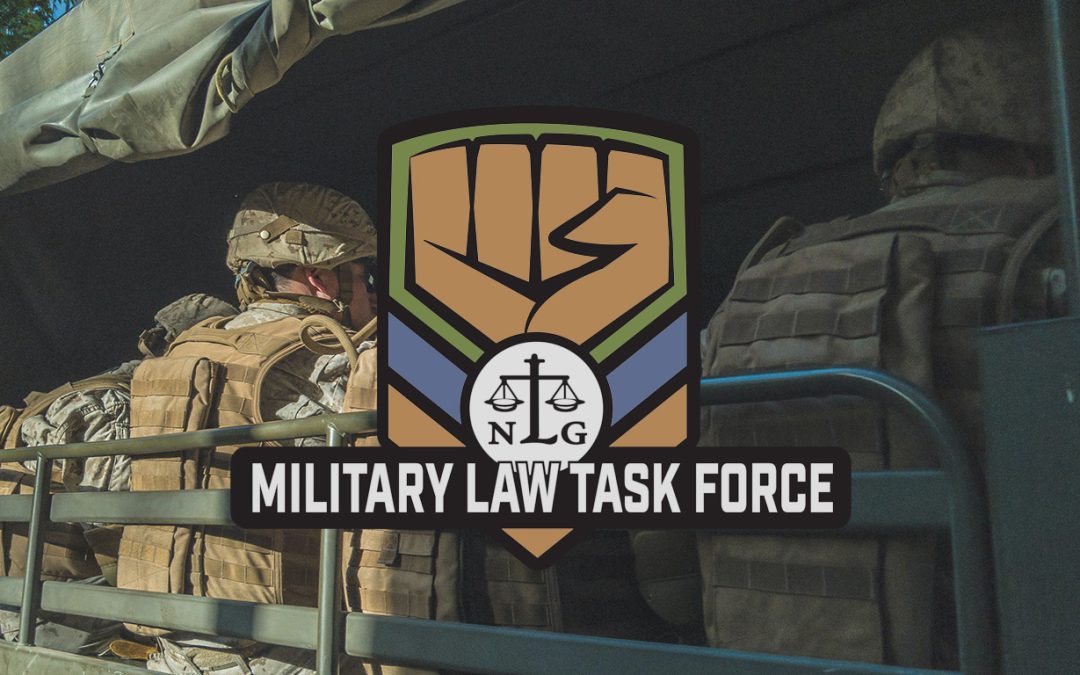By James M. Branum
The Military Law Task Force has played a key role with the GI Rights Network (GIRN) since its early days, providing assistance for counselors seeking attorney referrals but also providing training and resources to the lay counselors of the network.
At the 2019 GIRN conference, held from May 16 through 19 in Chicago, the MLTF was well represented with several MLTF members in attendance, and three presenting workshops: myself, Jim Klimaski and Dawn Blanken.
Participants included representatives from almost all of the member nodes of the network, as well as many allied groups including the Civilian Medical Resources Network (CMRN) and Veterans for Peace.
The conference primarily consisted of participatory workshops for continuing education of counselors, but networking is also a vital component of every GIRN conference. Highlights include:
- “Grievances for Dummies” – This was discussion led by Steve Woolford, Leonore Yarger and Dawn Blanken on some of the ways that servicemembers can raise grievances with their commands and outside parties including through the use of Article 138 complaints, IG complaints, congressional inquiries, as well as less formal methods of addressing problems. Much of this workshop focused on how experiences of racial and gender-based discrimination can be addressed.
- 2019 Changes to the UMCJ and its effect on GI Rights counselors – This discussion, led by MLTF member attorneys Jim Klimaski and myself, discussed the historic 2019 changes to the UCMJ, which included some major new (but untested) provisions that protect servicemembers from retaliation. The workshop emphasized the need to further study these changes but also to observe how these changes may end up actually functioning.
- Servicemembers with undisclosed pre-existing conditions – Due to the widespread practice of military recruiters telling their recruits to conceal pre-existing physical and mental health issues, this topic has become very relevant. This discussion was led by Dawn Blanken.
- How to help servicemembers on the autism spectrum – I spoke about the need for a deeper understanding of the autism spectrum (including the concepts of understanding autism through either the mental illness model versus the neurodiversity model), and the reasons why many autistic people are not diagnosed until adulthood, which means that some autistic young adults end up being able to enlist in the military in good faith, yet later have serious problems coping with the unique nature of military life, and how GI Rights counselors and attorneys can effectively advocate on their behalf.
- CMRN Update – This workshop, led by Laura Muncy and Howard Waitzkin discussed the work of CMRN and best practices for GI Rights counselors who are seeking the assistance of CMRN on a case, most often in getting psychological evaluations completed.
- Refusal to Train – Leonore Yarger and Steve Woolford led a lively discussion on the oftdiscussed but seldom understood concept of “refusal to train” as a method of forcing a command to grant a military discharge.
- An update on GI Resistance – I led a discussion on the current state of GI Resistance and the movement that supports it (including the work of Courage to Resist, About Face, Veterans for
Peace and others) which morphed into a discussion on outreach (both for GIRN and the GI Resistance movement) and future plans for GIRN to more fully engage in social media outreach.
- Officer Cases – Steve Woolford and Leonore Yarger led a workshop on the intricacies and differences of officer cases as compared to cases of enlisted personnel.
- Racism in the Military – Probably the highlight of the conference was a presentation by
Natasha Erskine on her experiences with racism and bias during her 20 year career in the US
Air Force, as well as the widespread prevalence of racism and bias at all levels of the US Armed Force, and the role of militarism itself in propping up our nation’s continued practice of white supremacy.
- Case studies – The conference allocated several blocks of time to discuss hypotheticals and past cases, allowing counselors to share how they handled cases and asking for input on what should have been done differently.
I came away from the conference encouraged by the quality of care provided by this generation of GIRN counselors, but also concerned that, should a major war be initiated by President Trump, the need for GIRN’s services could easily stretch beyond current capacity. This is why I would urge all MTLF members to get plugged into the work of the network when possible. Local nodes of the network are often looking for new GI Rights counselors, but the network also needs attorneys for cases to be referred to. Some of these referrals are done directly by individual counselors and nodes but more often callers are directed to the MLTF itself, so attorneys who are willing to take these cases should be in touch with our executive director, Kathy Gilberd. She of course will need your contact information but also information on what kinds of cases you might be able to take (i.e. do you only take cases in a certain locale, only cases from a particular branch of the military).
The GI Rights Hotline <girightshotline.org> is a free, independent provider of accurate, helpful counseling and information on military discharges, AWOL and UA, and GI Rights. It is staffed by trained, volunteer counselors working through member nodes located across the country. Those seeking assistance can call 1-877-447-4487. MLTF members wishing to join or assist GIRN can contact Kathleen Gilberd, MLTF Executive Director, at email@nlgmltf.org.
James M. Branum is an Oklahoma City-based attorney who primarily practices military criminal defense law, with a special focus on US Army absence offences, as well as clients facing consequences for resisting war. He is a member of the MLTF steering committee. He is the author of US Army AWOL: A Practice Guide and Form Book, which will soon be out in a new edition. See jmbranum.com/.



